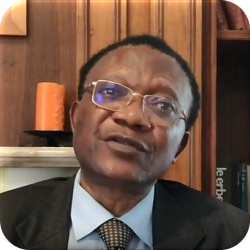Religious Diplomacy
Understanding Religion’s Complexity


Religious Diplomacy Expert
Prof. Martin Nkafu


Religious Diplomacy Expert
Prof. Martin Nkafu

At the end of the Twentieth Century as the ideological ice was melting on two geopolitical poles, new tensions started to emerge.
Every blind fanatic prayer can dare to say that there are only two religions in the world.
On one side his religion and on the other side paganism.
It is not enough just to talk about a better dialogue. All citizens must act to meet this need and reach this goal.
In many countries around the globe, a comprehensive look at almost any policy area requires attention to religious dynamics.
When travelling we, always, meet different kind of religious leaders all across the world.
Some are religious leaders and other are leaders of some kind of life philosophies and belief systems, in which they deeply believe in and call religion and faith.
All these experiences can only reaffirm and empower our belief that there is much more that unites us, and should unite us, than divides us.
With all migration flows taking place in many zones of the world, the social impact of religion is deeply high.
What is migration ?
Migration is the movement of people from one place to another, to settle in a new location.
Migration can be voluntary or involuntary and can occur for a variety of different reasons, including economic, environmental and social issues.
Embassies and Consulates around the world must improve their capacity to assess religious dynamics and engage religious actors.
Foreign service officers must know how to work effectively with local religious individuals and groups.
Finally, it serves as an initial point of contact for organizations and people interested in discussing foreign policy issues related to religion.
Religion plays a role in these processes since it serves as a source of political legitimatisation, acts as an identity factor and can still explain the
reality to populations faced with an increasingly globalized world.
In some cases, rediscovering religion means regaining forgotten heritage, historical memory and, last but not least, reconstructing national identity.
Every major religion of the world at some point has been a target by specific groups to utilize its tenets for their particular objectives.
Moreover, religion as a prominent feature of social identity influences individual altitudes and behaviours of a population.
One of the most interesting challenges Diplomats face in global diplomacy today is the need to fully understand and
engage the great impact that a wide range of religious traditions have on foreign affairs.
An important approach in modern religious diplomacy is the "Art of Listening" and the "Art of Deeply Understanding", not only the message, but all around the message like the metamessages and other concepts.
Listening to other people's thoughts and suggestions in order to work with them on matters of significance to both sides.
Why listen and understand "Religious Leaders" from the five continents ?
Because these religious leaders and actors are key players in their countries, holding influence at both local and national levels.
And because engagement is a two-way street and foreign policy will be better informed by hearing what they have to say.
In a papal encyclical letter called "Laudato Si " ("Praised Be") Pope Francis declared that the science of climate change is clear and that the Catholic Church views climate change as a moral issue that must be addressed in order to protect the Earth and everyone on it.
But even before Pope Francis issued his encyclical, worldwide organizations across the religious spectrum raised the banner against global warming.
"Religious Diplomacy" must trigger a leading engagement with local communities and strengthen relationships with local civil society institutions.
These activities must be done on a regular scheduled basis, to drive and address shared challenges and threats and how best to take advantage of opportunities to collaborate
in areas like increased trade and investment, to empower the values of tolerance, pluralism and local democracy.
Promotion of theological and religious spiritual values such as love, forgiveness, humility, esteem, solace, mercy, reconciliation positively contributes to a resolution of any kind of confrontation and peace - building.
People engaged in "Religious Diplomacy" must use all kind of educational content like interactive and immersive materials and extreme advanced creative teaching methodologies and learning environments
to quickly increase their knowledge and always be updated on the news of this swivelling and turbolent arena of religions and religious dynamics around the world.
In order to best match in a comprehensive framework the foreign policy goals.
A new approach is required to reach religious leaders, actors and groups of different nations.
All Governments must understand the central role that religion plays in the lives of billions across the globe, and must know how engagement can open a
world of possibilities and shortcuts.
Foreign policy needs a more sophisticated approach to religion, based on a fundamental truth as well.
The challenging array of foreign policy issues can never match with the turbolence and influence of religions taking place today around the world,
because change is and will be the only constant factor in our complex society.
We must be careful to not overemphasize the role of religion and to properly understand its intersection and the bounderies with political, economic and other social factors.
Religion is a multidimensional energy and force, that expands over belief and faith.
Mediterranean Academy
of Cultural Diplomacy
Joseph Caristena
President
For info:
Mobile: +39 349 1456195
Email: info@saloneuropa.it
Read more ...
OPUS DEI
OPUS DEI